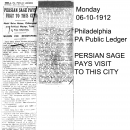Main menu
- ‘Abdu’l-Bahá’s Journey
- World Peace
- Stopping Racism in America
- Empowerment of Women
- More Principles...
- Prayer for America
Persian Sage Pays Visit To This City
‘Abdu’l-Bahá Abbas, Philosopher and Political Martyr, Talks in Two Churches.
MAXIMS FOR NEWSPAPERS
‘Abdu’l-Bahá Abbas, Persian philosopher and martyr, who is today revered as the head of more than [uneradable text] 3,000,000 followers in his gentle and kindly religious cult, paid a flying visit to this city over the weekend, attended by Dr. Ameen U. Fareed, Mirza Ali Akbar and Mirza Ahmed Sohrab.
To learn the significance of the visit, a reporter for the PUBLIC LEDGER hastened to the Rittenhouse Hotel yesterday afternoon and was immediately ushered into the philosopher’s suite of rooms, where an informal audience was in progress.
A dozen women were sitting at the feet of the master - metaphorically speaking. As a matter of fact, they were sitting, very erect and self-conscious, on the edge of straightbacked chairs, dotted here and there about the room. Over by the window the venerable philosopher leaned back in a deep armchair and surveyed his visitors benignantly. Close at hand was a Persian member of the staff, an open copybook on his lap, eagerly gathering in pearls of philosophy and fragrant flowers of speech. Finally there came a lull in the proceedings. Guttural murmurs in Persian and Arabic were exchanged at length. The interpreter switched round on his chair.
“‘Abdu’l-Bahá asks how many newspapers you have in this city?”
“Nine or ten, I think.” The information was transmitted.
The philosopher nodded and made a comment.
“‘Abdu’l-Bahá says that is very good,” volunteered the interpreter.
And there and then ‘Abdu’l-Bahá Abbas, who is only a few months free from 40 long years’ imprisonment for the expression of his progressive teachings in the fever-racked penal settlement at Akka, in Syria, delivered himself of a series of maxims for American journals and journalists. They were punctuated by impressive pauses, and this is how Interpreter Ahmed Sohrab passed them across from the vernacular:
“Newspapers are the mirrors that reflect the progression or the retrogression of the community.
“We may ascertain the progress or the retrogression of a nation by its journalism.
“If journalists should abide by their duties, they would be the promoters of many virtues among the community. Truth and the virtues would be fostered. This would be so if they carried out the duties incumbent upon them.
“Journalists must serve truth.
“Newspapers must investigate the means for the progress of humanity, and publish them.
“Journalists must write significant articles, articles that shall foster the public welfare. If they so do they will be the first agents for the development of the community.
“From the days when newspapers were first published they have been the cause of progress: if they abide by their duties great will be the benefits forthcoming.
“Journalists must endeavor to make [text missind] their organ a trustworthy agent, in order that their articles may be effective in the hearts of the people and that the readers of these articles may be edified.”
‘Abdu’l-Bahá went on to discuss the parks of Philadelphia, he was gratified to hear of the open air opportunities offered by Fairmount Park. He told how struck he had been on this his first visit to America, with the self-sufficiency - in the highest sense of the word - of the American city, with its own parks and museums and libraries and educational institutions. In the East, he said, the capital city of the nation is a model city, but squalor and lack of the concrete amenities of life characterize the towns of the provinces.
The philosopher gave his views on the much vexed question of Sunday amusements for the people.
“Man must have one day to rest from everything, to have composure, with neither body occupied nor mind. This is necessary. Therefore on Sunday all affairs shall be at a standstill and man must be occupied with the contemplation of God.” Nevertheless, he added, the reading of books on Sunday is a good thing, and “if edifying moving-picture shows be available on Sunday, it is a good thing to go to them.”
‘Abdu’l-Bahá spoke yesterday morning at the Spring Garden Unitarian Church, on the unity of all mankind. He said woman should be so educated as to place her on an equal footing with man, and he even goes so far as to suggest that where a man cannot afford to educate both son and daughter he should educate the daughter, for the woman is the mother and the teacher of the race.
The philosopher compared humanity to a bird, one wing man, the other woman. Both wings are needed for flight. If one wing be defective the unharmed wing will not be capable of flight.
‘Abdu’l-Bahá delivered an address last night in the Grace Baptist Temple. Many years ago the Rev. Dr. Russell H. Conwell visited him in the penal settlement of Akka, and asked him to visit Philadelphia if ever the opportunity presented itself. Then, two years since, with the ascendancy of the Young Turks and the overthrow of ‘Abdul Hamid, came his release. For awhile the venerable philosopher took up his residence at Haifa, at the foot of Mount Carmel, of Biblical fame. Thence he visited Paris and London. He visited friends in America in April and is just now living in New York, whither he will return today.









